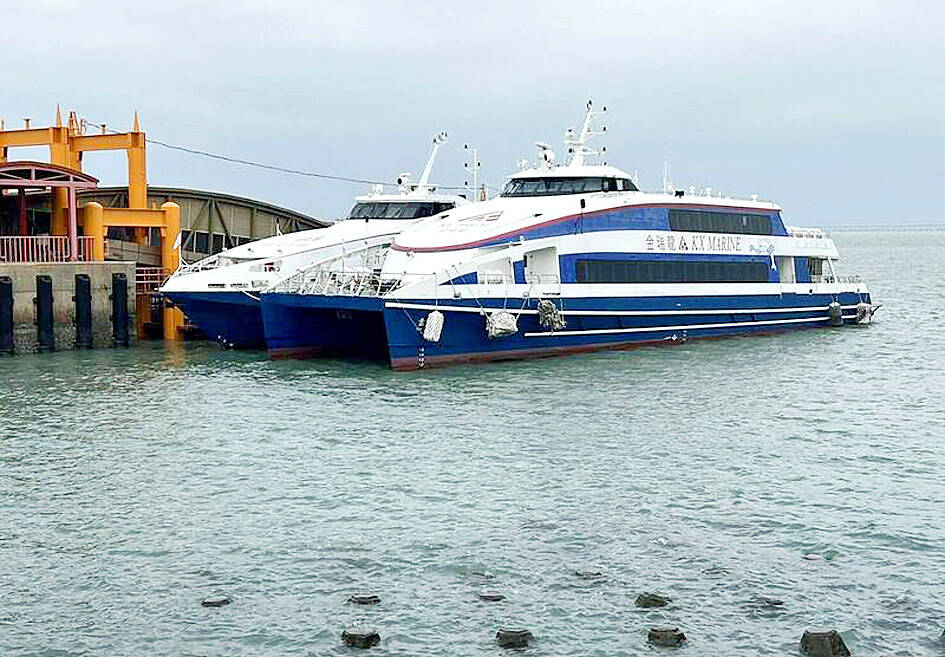Aging crews on ferry services to outlying islands could soon be a problem if they cannot find people to succeed them after they retire, maritime experts said.
The nation has 26 ferry services to outlying islands, which are operated by 70 captains, Port and Maritime Bureau statistics showed. The average age of these captains is 52. On some ferry routes, captains are still operating ships even after they turn 80, the bureau said.
Taipei University of Marine Technology associate professor Chang Tsai-hsin (張在欣) attributed the aging crews on ferry services to stable incomes and low career thresholds. It might also be a career choice for those whose homes are in the coastal areas or seeking a family-oriented life, she said.

Photo: Chen Hsin-yu, Taipei Times
“Most of the boats that are used for ferry services weigh between 20 tonnes and 500 tonnes. There is no education and age limit for those seeking to operate ferries. So long as they have certificates for third-class mates or first officers and have worked as third-class mates or first officers for at least one year, they can make this a life-long career,” Chang said.
“Because of relatively lower career thresholds, the jobs are mostly done by those who switch their careers when they are middle-aged,” she said.
Unlike crew members working on international commercial ships, who are subject to frequent deployment, crews on ferries work fixed schedules and usually need to care for family members.
Chang said that the booming international shipping business during the COVID-19 pandemic, which allowed some shipping firms to give their employees 40 to 45 months of salaries as bonuses, has motivated more young people to pursue a career in shipping.
“Some hope to earn their first ‘bucket of gold’ by working in the shipping business, while others hope to accumulate work experience and would work on ferries or inland shipping services when they get older,” she said.
The bureau said that the average age of captains who operate ferries is about the same as those working for ocean freight shipping and near-sea shipping lines.
Compared with training for other crew members, training a captain takes a relatively long time, the bureau said.
Crews on ferries are mostly local residents or those who are familiar with the routes they work, it said.
“We are encouraging shipping firms to train their own crews. They can also recruit crew members through our smart service platform,” the bureau said.
Cheng Tsuen-ren (鄭尊任), who operates ferries between Magong City in Penghu County and Da Tsang Islet (大倉嶼), said residents there live by the sea and can operate boats from when they are a child.
As a licensed captain, Cheng operates two ferry trips per day, assumes the job of village warden and goes sea fishing at night, he said.
North-South Shipping Firm chairman Chen Kai-shou (陳開壽) said both his son and his nephew are captains and have been trained to operate boats ever since they were children. Now they can operate big boats and have no trouble navigating among islands, and between outlying islands and Taiwan proper.
“I prefer to recruit people who are familiar with sea, sea weather, reefs and waves,” Chen said.

Chinese Nationalist Party (KMT) Chairman Eric Chu (朱立倫), spokeswoman Yang Chih-yu (楊智伃) and Legislator Hsieh Lung-chieh (謝龍介) would be summoned by police for questioning for leading an illegal assembly on Thursday evening last week, Minister of the Interior Liu Shyh-fang (劉世芳) said today. The three KMT officials led an assembly outside the Taipei City Prosecutors’ Office, a restricted area where public assembly is not allowed, protesting the questioning of several KMT staff and searches of KMT headquarters and offices in a recall petition forgery case. Chu, Yang and Hsieh are all suspected of contravening the Assembly and Parade Act (集會遊行法) by holding

PRAISE: Japanese visitor Takashi Kubota said the Taiwanese temple architecture images showcased in the AI Art Gallery were the most impressive displays he saw Taiwan does not have an official pavilion at the World Expo in Osaka, Japan, because of its diplomatic predicament, but the government-backed Tech World pavilion is drawing interest with its unique recreations of works by Taiwanese artists. The pavilion features an artificial intelligence (AI)-based art gallery showcasing works of famous Taiwanese artists from the Japanese colonial period using innovative technologies. Among its main simulated displays are Eastern gouache paintings by Chen Chin (陳進), Lin Yu-shan (林玉山) and Kuo Hsueh-hu (郭雪湖), who were the three young Taiwanese painters selected for the East Asian Painting exhibition in 1927. Gouache is a water-based

Taiwan would welcome the return of Honduras as a diplomatic ally if its next president decides to make such a move, Minister of Foreign Affairs Lin Chia-lung (林佳龍) said yesterday. “Of course, we would welcome Honduras if they want to restore diplomatic ties with Taiwan after their elections,” Lin said at a meeting of the legislature’s Foreign Affairs and National Defense Committee, when asked to comment on statements made by two of the three Honduran presidential candidates during the presidential campaign in the Central American country. Taiwan is paying close attention to the region as a whole in the wake of a

OFF-TARGET: More than 30,000 participants were expected to take part in the Games next month, but only 6,550 foreign and 19,400 Taiwanese athletes have registered Taipei city councilors yesterday blasted the organizers of next month’s World Masters Games over sudden timetable and venue changes, which they said have caused thousands of participants to back out of the international sporting event, among other organizational issues. They also cited visa delays and political interference by China as reasons many foreign athletes are requesting refunds for the event, to be held from May 17 to 30. Jointly organized by the Taipei and New Taipei City governments, the games have been rocked by numerous controversies since preparations began in 2020. Taipei City Councilor Lin Yen-feng (林延鳳) said yesterday that new measures by